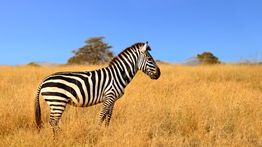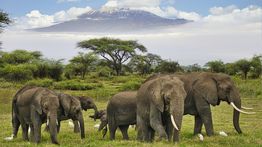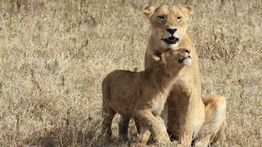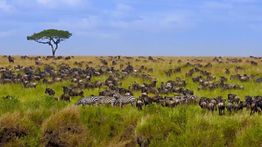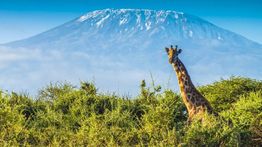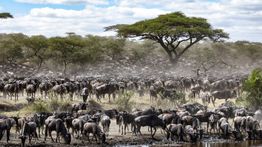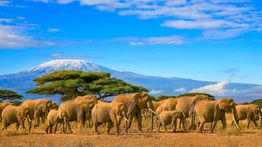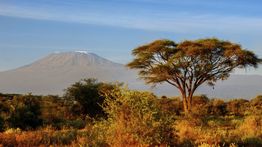Tanzania in November: Weather, Travel Tips & More
Tanzania, in November, sees sporadic rain showers, but just enough to awaken the country’s dry landscape. Temperatures reach highs of 30°C and lows of 25°C during this time. If you brave the rain, you will be rewarded with lively, verdant views of the Serengeti National Park, the Ngorongoro Crater, and plenty of other reserves. This is also the time of year when Tanzania receives much migrant wildlife coming in from Kenya. Then there are also the low-season perks to a Tanzania trip in November like sparse tourist crowds and attractive travel deals.
- Nova Ava
- From Estonia
Tanzania Weather in November
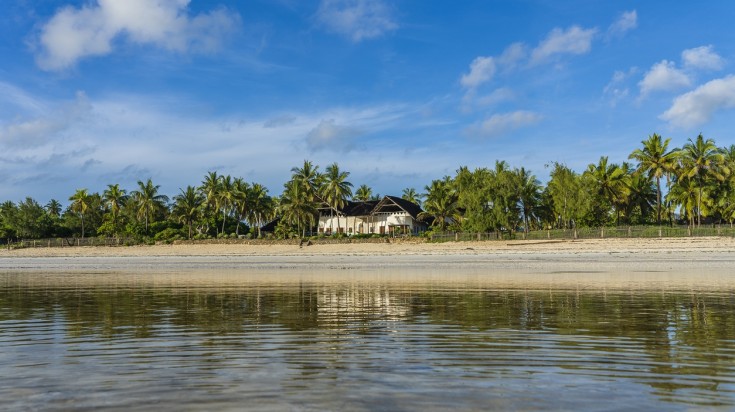
In Tanzania, November brings the 'Vuli', which is the short rainy season. The rainfall during this month can be unpredictable, typically ranging from 80mm to 150mm. Temperatures reach highs of 30°C and lows of 25°C during this time. Despite the rain, many days are dry and perfect for outdoor activities. The showers usually occur in the afternoon or evening.
Along the coast and on islands like Zanzibar, Pemba, and Mafia, temperatures range between 26°C and 32°C, signaling the beginning of the hot season. In the northern and southern highlands, including areas around the Serengeti, the temperatures remain mild, typically ranging from 20°C to 25°C.
To get a clearer picture, check out our guide on the best time to visit Tanzania.
Weather in Tanzania in November - Rainfall and Temperatures
| Jan | Feb | Mar | Apr | May | Jun | Jul | Aug | Sep | Oct | Nov | Dec | |
|---|---|---|---|---|---|---|---|---|---|---|---|---|
| Avg Daily (°C) | 31 | 31 | 31 | 30 | 28 | 28 | 28 | 28 | 29 | 30 | 30 | 31 |
| Avg Nightly (°C) | 25 | 25 | 25 | 24 | 23 | 22 | 21 | 22 | 22 | 23 | 25 | 25 |
| Avg Daily (°F) | 88 | 88 | 88 | 86 | 83 | 83 | 83 | 83 | 85 | 86 | 86 | 88 |
| Avg Nightly (°F) | 77 | 77 | 77 | 76 | 74 | 72 | 70 | 72 | 72 | 74 | 77 | 77 |
| Avg Rainfall (mm) | 75 | 51 | 140 | 255 | 200 | 45 | 25 | 25 | 25 | 70 | 125 | 120 |
| Oct | Nov | Dec | |
|---|---|---|---|
| Avg Daily (°C) | 30 | 30 | 31 |
| Avg Nightly (°C) | 23 | 25 | 25 |
| Avg Daily (°F) | 86 | 86 | 88 |
| Avg Nightly (°F) | 74 | 77 | 77 |
| Avg Rainfall (mm) | 70 | 125 | 120 |
Why Visit Tanzania in November


Tanzania enters its short rainy season, which is accompanied by bright yet refreshing sunny days, in November. With fewer crowds, affordable accommodations, and vibrant bird-watching opportunities, a trip to Tanzania in November can be lucrative to many.
- Wildebeest migration: Spotting the Big Five—lion, leopard, rhinoceros, African elephant, and Cape buffalo—may be the highlight of an African safari, but witnessing the wildebeest migration is also nothing short of spectacular. If you are in Tanzania in November, this is your opportunity to encounter the massive wildebeest migration on the trip to Serengeti National Park.
- Fewer crowds: November falls within the shoulder season, which means fewer visitors in national parks of Tanzania compared to the peak tourist months. This translates into a more intimate and exclusive safari experience. With fewer vehicles around, you can enjoy the tranquility of the wilderness and have uninterrupted wildlife encounters. The absence of crowds allows for a deep connection with nature and a greater appreciation of the stunning landscapes and wildlife.
- Lower accommodation rates: November presents an opportunity for budget-conscious travelers to experience high-quality accommodations at lower rates. Many lodges and camps offer discounted prices during this shoulder season. This is an excellent chance to indulge in luxury accommodations that might be outside your budget during the peak season.
- Snorkeling experience: November is the best time to explore the seafloor of Tanzania. Mafia Island is nothing short of a paradise, with its beautiful coral reefs and rich marine life, including the whale shark, the world’s largest fish species.
- Birdwatching: November is a paradise for birdwatching enthusiasts in Tanzania. The arrival of the short rainy season brings an influx of migratory bird species. The vibrant colors and melodious calls of the birds create a captivating symphony of nature.You may encounter species such as the lilac-breasted roller, the African fish eagle, various species of hornbills, and the Secretary Bird.
Where to go and what to do
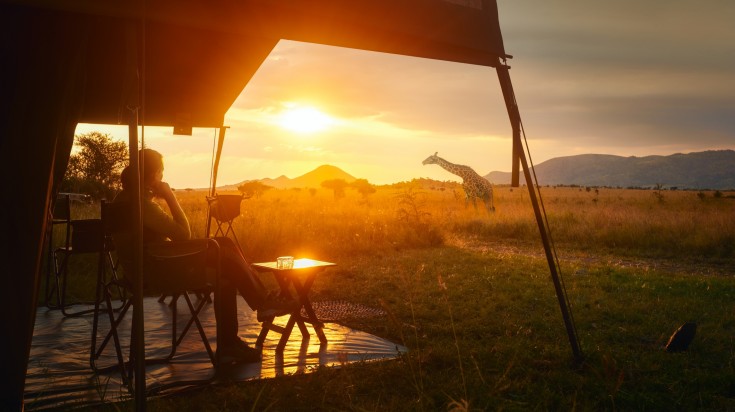
The southern safari parks in Tanzania witness a full commotion with wildlife herds migrating in search of food in November. The main highlight here is that Nyerere National Park puts up a full-fledged show of wildlife in action during this time of year. The Mahale and Gombe national parks in the western region are perfect destinations for chimpanzee treks. Take a look at our guide for safaris in Tanzania for a complete overview.
The remote Mahale Mountains National Park is also worth the difficult access for a chance to track and observe chimpanzees in the wild. Katavi National Park in the southwest corner of Tanzania provides pristine wilderness and opportunities to see hippos and crocodiles along the Katuma River.
In the north, the phenomenal Ngorongoro Crater should be at the top of your itinerary. This UNESCO World Heritage site within the Ngorongoro Conservation Area offers a unique safari experience as you descend 610 meters down to the floor of a magnificent extinct volcano that teems with an abundance of wildlife, including the Big Five. You'll be awestruck gazing out over this massive natural enclosure and coming face-to-face with everything from the pride of lions lazing about to gigantic bull elephants trekking across the lush Crater floor.
Nearby, Tarangire National Park is also excellent in November for observing substantial herds of elephants congregating near the river valleys and wetlands. For a more isolated safari adventure, head to the remote Lake Natron region, where you can take part in walking safaris and marvel at the otherworldly volcanic scenery far removed from the crowds of tourists.
Don't miss out on Kilimanjaro National Park in November, when the views of Africa's highest peak are clearest during the dry season. Activities include day hikes through the lush rainforest surrounding Kilimanjaro and observing elephant herds in the caldera of Shira Plateau. For the ultimate bucket list experience, climb to the summit of Mount Kilimanjaro or take a scenic flight over the entire mountain.
The idyllic island of Zanzibar is a perfect place to end a November Tanzania safari. The rainy season has passed by November, leaving sunny, dry weather ideal for relaxing on Zanzibar's famous white sand beaches, like Kendwa and Nungwi on the northern tip of the island. The sea is calmest at this time of year, with tropical water temperatures around 27°C, so you can enjoy swimming, snorkeling, and scuba diving to spot sea turtles, dolphins, and colorful reef fish.
NEED HELP PLANNING YOUR FEBRUARY TRIP TO TANZANIA?
Tanzania combines the perks of both the wet and high seasons, wherein you get to see predators in action, the wildebeest migration, as well as exotic birds and aquatic species during the month of November. Crowd-free attractions and affordable travel and accommodation fares are an added plus to make your trip all the more worthwhile.
For a hassle-free trip to Tanzania, consider booking customized tours. Reach out to our local travel experts if you are interested in a personalized itinerary.
Other related articles:
Tanzania in December
Tanzania Private Tours

